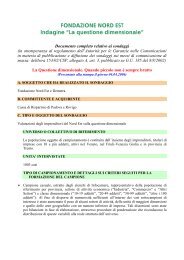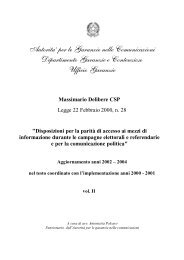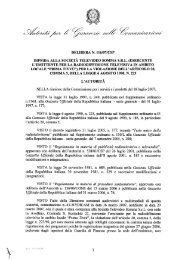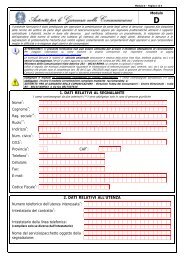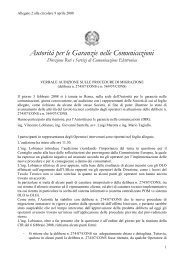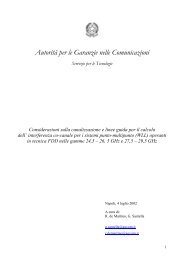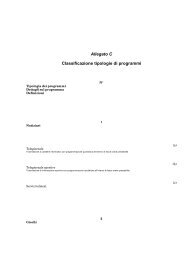Communications Regulatory Authority
Communications Regulatory Authority
Communications Regulatory Authority
You also want an ePaper? Increase the reach of your titles
YUMPU automatically turns print PDFs into web optimized ePapers that Google loves.
Table 1.5. Market shares in mobile networks* (%)<br />
Revenues Active lines<br />
2004 2005 2004 2005<br />
TIM 45.7 42.4 41.8 40.0<br />
VODAFON 37.1 35.7 35.3 33.1<br />
E<br />
WIND 14.3 15.2 18.5 19.1<br />
H3G 2.9 6.7 4.5 7.8<br />
Total 100.0 100.0 100.0 100.0<br />
Source: corporate data processed by AGCOM | *Due to some changes in the calculation<br />
methods made by companies, to reclassifications and, in other cases, to changes in the<br />
range of activities carried out, market shares relating to 2004 are not perfectly<br />
comparable with the corresponding values indicated in the previous Report to<br />
Parliament.<br />
In this market scenario, results of voice revenues suffered from the competitive pressure<br />
in prices and, thus from strategies implemented by mobile operators aiming at taking<br />
away customers from competitors. In particular, many efforts were made to acquire new<br />
customers thanks to mobile number portability (MNP). With this mechanism an<br />
operator replaces entirely the previous operator of the user, without limiting itself, as it<br />
was in the past, to be added to the original operator as service provider on another SIM.<br />
In this connection, it is necessary to point out that - thanks also to the ongoing<br />
interventions of AGCOM aiming at first introducing and then improving the portability<br />
service effectiveness (cf. paragraph 2.3.) - Italy ranks second in Europe as to MNP<br />
spreading, with over 8 million numbers brought from one operator to another (figure<br />
updated as at April 2006). In a situation in which the penetration of the mobile<br />
telephony service is close to saturation, number portability contributed to reduce<br />
barriers to entry and change (so-called switching costs), encouraging the competition<br />
process for the full benefit of consumers. During the year operators launched offers<br />
proposing mobile phones at very attractive prices and advantageous rates provided that<br />
users commit themselves not to change operator for a limited time; in this case as well<br />
AGCOM intervened in order to protect end users, by regulating the SIM lock practice<br />
(cf. paragraph 2.3.).<br />
The competition of mobile operators does not entail only prices, but it focuses also on<br />
the introduction of product innovation. In addition to the considerable growth of 3G<br />
63



